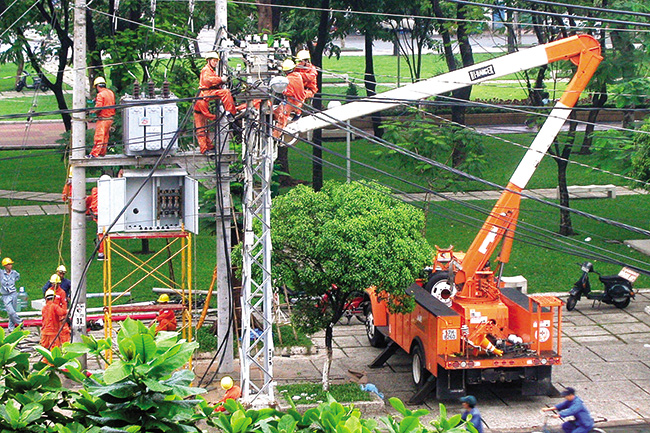Toyo Ink Group still on look out for power plant partners
 |
| The power sector is expected to be the driver of Vietnam’s foreign direct investment growth this year-Photo: Le Toan |
According to VIR’s source, Toyo Ink has been approached by a number of utility firms and independent power producers for equity partnership in the $3.5 billion project. However, no movement has yet been reported.
A memorandum of understanding (MoU) was signed by Toyo Ink for the 2,000 megawatt Song Hau 2 coal-fired power plant under a build-operate-transfer (BOT) agreement in 2013. The plant is part of the 5,200 megawatt Song Hau power centre in Hau Giang industrial park. The power centre will be home to three separate power plants, including the 600MW Song Hau 1, operated by Vietnam’s state-run oil and gas group PetroVietnam.
Toyo Ink’s Vietnam representative office head, Nguyen Hung Viet, shared with VIR that the first phase would have a capacity of 1,000MW by 2021 with the second phase generating 2,000MW by 2022.
Last year, Toyo Ink’s managing director Steven KC Song said that “By inviting other parties to join the project, the pressure for us to raise capital is greatly diminished. We hope to remain the single largest shareholder of the plant, but not necessarily with a controlling 51 per cent stake.”
Viet stated that “There has been interest shown from various partners but we have not finalised anything yet,” and added “These partners are foreign invested firms.”
Toyo Ink is trying to obtain all the relevant permits, including the power purchase agreement, which is considered the hardest job for foreign investors in Vietnam’s power sector. Such negotiations can take years to complete.
The Song Hau 2 plant plans to use imported coal from Indonesia and Australia. It also fuels its turbines using diesel oil from Dung Quat and Nghi Son oil refineries.
This is one of three projects which Malaysian firms have invested in Vietnam’s power sector. Jaks Resources’ Hai Duong thermal power plant in the northern province of Hai Duong is currently under construction.
Meanwhile, Janakuasa Sdn Bhd’s Duyen Hai Hai 2 this year signed four documents with Vietnam’s Ministry of Industry and Trade (MoIT) for the development of the 1,200MW Duyen Hai 2 coal-fired power plant in the southern province of Tra Vinh. The agreement includes a land-lease deal, a power purchase agreement, BOT contract, and a government guarantee after six years of active negotiations.
According to the MoIT, Vietnam needs to add another 36,000MW generated from thermal power plants into the supply system by 2020, to ensure the nation’s power security. The growing demand for power supply is encouraging more and more foreign power companies to invest in Vietnam.
This year the Vietnamese energy sector is expected to be the next driver for foreign direct investment (FDI) growth in the country. Industry insiders predicted that the FDI commitment level in this sector would touch a record high of $4-$5 billion in 2016.
What the stars mean:
★ Poor ★ ★ Promising ★★★ Good ★★★★ Very good ★★★★★ Exceptional
Latest News
More News
- Site clearance work launched for Dung Quat refinery upgrade (February 04, 2026 | 18:06)
- Masan High-Tech Materials reports profit: a view from Nui Phao mine (February 04, 2026 | 16:13)
- Hermes joins Long Thanh cargo terminal development (February 04, 2026 | 15:59)
- SCG enhances production and distribution in Vietnam (February 04, 2026 | 08:00)
- UNIVACCO strengthens Asia expansion with Vietnam facility (February 03, 2026 | 08:00)
- Cai Mep Ha Port project wins approval with $1.95bn investment (February 02, 2026 | 16:17)
- Repositioning Vietnam in Asia’s manufacturing race (February 02, 2026 | 16:00)
- Manufacturing growth remains solid in early 2026 (February 02, 2026 | 15:28)
- Navigating venture capital trends across the continent (February 02, 2026 | 14:00)
- Motivations to achieve high growth (February 02, 2026 | 11:00)
















 Mobile Version
Mobile Version